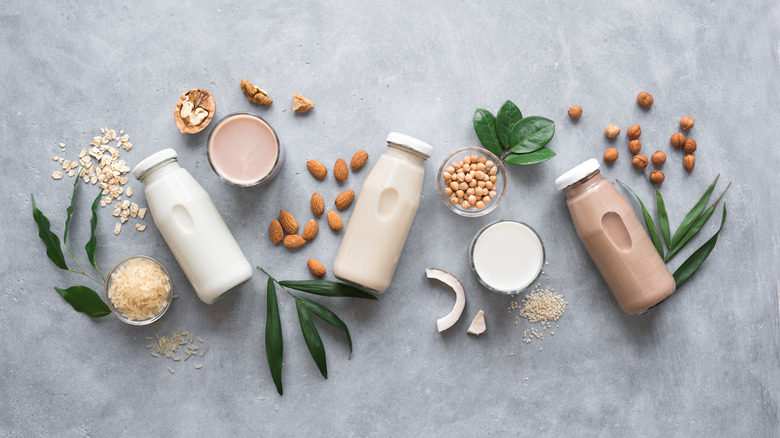This Is What Happens When You Drink Too Much Dairy-Free Milk
Dairy-free milk options are growing so quickly, it's hard to believe that not so long ago soy milk used to be the only choice for those with a milk allergy wanting to order a latte at a coffee shop. So large is the non-dairy milk alternatives industry that Grandview Research estimated its U.S market worth to be $11.90 billion dollars in 2017. And it continues to grow with the introduction of cashew, macadamia nut, and pistachio milks recently hitting the shelves. All of these fun alternatives are a welcome choice for those who are still searching for the perfect replacement to cow's milk. But what could happen if you end up drinking too much dairy-free milk?
The first thing that could happen is the false belief that you are getting enough calcium. A lot of alt-dairy milks may boast having large amounts of calcium per cup, but that doesn't mean you're getting enough. Registered dietitian Sonya Angelone, a spokeswoman for the Academy of Nutrition and Dietetics explains to Epicurious why this is. "The problem is, they often don't use the best-quality supplements or it's not enough or not the right form of it," she says. Adding, "Higher [calcium] is not necessarily a good thing because the more you get of it at once, the less you absorb." So whether you drink the regular stuff or an alternative option, make sure you are getting your calcium from a variety of other foods.
Don't treat all dairy-free options the same
Besides a possible calcium deficiency, there are some other more obvious signs you are drinking too much dairy-free milk. Angelone shares with Epicurious that the carrageenan that is often added to give alt-milk that thicker and creamier milk-like consistency can cause stomach discomfort. "Some experts say it irritates the gut lining and activates an immune response that dials up inflammation," she says. She recommends looking for options that say they are carrageenan-free on the packaging.
Dairy-free milk may feel like the "healthier" option to some, but they could be the reason for your sudden weight gain depending on which one you choose. So it's important to not treat all dairy-free milk options as if they were the same. According to Healthline, unsweetened rice milk boasts 22 grams of carbohydrates and 10 grams of sugar while almond milk only has one gram of carbs and 0 grams of sugar.
We don't want to scare you off your favorite dairy-free milk alternative. A dairy-free lifestyle will not hurt your health if you have a balanced diet. But if you are experiencing unexplained weight gain, a possible calcium deficiency, or increased stomach discomfort, eye your dairy-free milk with suspicion and consider cutting back. That, or mix it up and try a new one.


